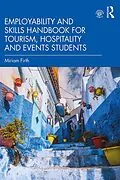This handbook provides students with an essential understanding of the skills and knowledge needed to work in the tourism, hospitality and events industries. It offers reflective, reflexive and critical analysis on personal, academic and professional development.
Not only looking at how to develop the skills, attributes and prospects for employment in these competitive industries, this handbook also focuses on what the employers in tourism, hospitality and events sectors require of graduate employees. Highly illustrated, the chapters contain think points and activities, and case studies are integrated throughout offering first hand advice from both employer and graduate perspectives.
The first book to focus on skills and employability in tourism, hospitality and events, this is a must read for all students studying these fields.
Autorentext
Dr Miriam Firth has worked, researched and taught in tourism, hospitality and events management programmes for over 15 years. Building upon a career in hotel, restaurant and festival management she specialises in supporting the employability of students, and professional development for management in these sectors. From working, and the continued research, in these industries, her publications are informed from both published research and active experience in the contexts into which students will graduate. She is currently Senior Lecturer at the University of Manchester (ranked 27th in the world in 2019), Programme Director of BA (hons) Management, Leadership and Leisure, and Director of Teaching and Learning Strategy.
Inhalt
Part One: Employability skills for Tourism, Hospitality and Events Management
- Introduction to the textbook
- Sector Overviews
- Graduate Employment
- Skills for Tourism, Hospitality and Events Employment
- Text Structure
- Personal development in Tourism, Events and Hospitality
- Self-awareness
- Relationship skills
- Time Management
- Learning Styles
- Effective communication
- Goals and Targets
- Finding academic articles
- Reading academic texts
- Academic Writing
- Secondary and primary sources
- Motivating yourself
- Group work and alternative assessments
- Reflective and reflexive thinking and learning
- Networking
- Coaching and Mentoring
- Forms of employment experience
- Career Mapping
Introduction
Textbook scope
Key definitions: Employability and Skills
Using the textbook for professional development in Tourism, Hospitality and Management
Summary
References
Introduction
The scope of Tourism, Hospitality and Events Management Businesses
Leisure and Recreation: Overarching sectoral and research positions
Research strands in support of Tourism, Hospitality and Events Management Employability and Skill Development
Summary
References
Introduction
What is graduate employment?
Types of employment: SME, MNC, Non-profit, Public and Self
Employment and labour markets
Employment in Tourism, Hospitality and Events
Summary
References
Introduction
Core, key, and transferable skills
Being entrepreneurial 24/7
Matching skills to job descriptions in the service sectors
Summary
References
Introduction
Structure of the Textbook Chapters
Added support: Case study, Activity, & Think Points
Revision Questions, Additional Sources and Reference Lists
Learning gains from Learning Outcomes
A note for academics and teachers
Summary
Part Two: Personal Development
Introduction
A Personal Skills Appraisal
Skill mapping for Tourism, Hospitality and Events
Summary
Introduction
Definitions of Self-awareness
Critical thinking and neuro-linguistic programming for self-awareness
Personal performance and presentation
Summary
References
Introduction
Personal Relationships
Soft and interpersonal skills for professional relationships
Cultural, cross-cultural and intercultural tenets of relationships
Emotion, Aesthetics and Sexualisation in relationships
Being a citizen of the world
Summary
References
Introduction
Time management as a personal ability
Strategies for time management
Summary
Introduction
Approaches to learning
Learning styles
Learning forms and styles to aid academic and professional
Summary
References
Introduction
Forms of communication: verbal and non-verbal
Written and Digital communication
Summary
References
Part Three: Academic Development Strategies
Introduction
Framing your goals and targets through research approaches and philosophies
Types of academic goals and targets
Strategies for meeting goals and targets
Summary
References
Introduction
Forms of published academic material
Themes and key words
Methods for searching
Search techniques and choosing the literature
Summary
Introduction
Motivations for reading in personal, academic and professional contexts
Inductive and Deductive Reasoning for Reading
Surface and Deep reading
Strategies for effective reading
Summary
References
Introduction
Conventions within academic writing
Writing using judgement, power and balance
Strategies for academic writing
Summary
Introduction
Types and categories of sources
Using Primary and Secondary sources in different Research Methods
Sources used in academic and professional contexts
Summary
References
Introduction
Nurturing and developing your motivation
Motivational theories applied in academic and professional contexts
Summary
References
Introduction
Group work in studies leading to team working in industry
Forms of academic assessment for group work
Summary
References
Part Four: Professional Development
Introduction
Learning and thinking reflectively and reflexively
Reflecting upon leadership, management, manipulation and influence
Reflexive positions on leadership, management, manipulation and influence from THE management contexts
Summary
References
Introduction
Networking for academic and professional development
Skills for networking
Methods and processes for individual networking
Summary
Introduction
Performance Management
Coaching and Mentoring
Utilising coaches and mentors for your career planning and development
Summary
References
Non-traditional locations for THE employment experience
Summary
